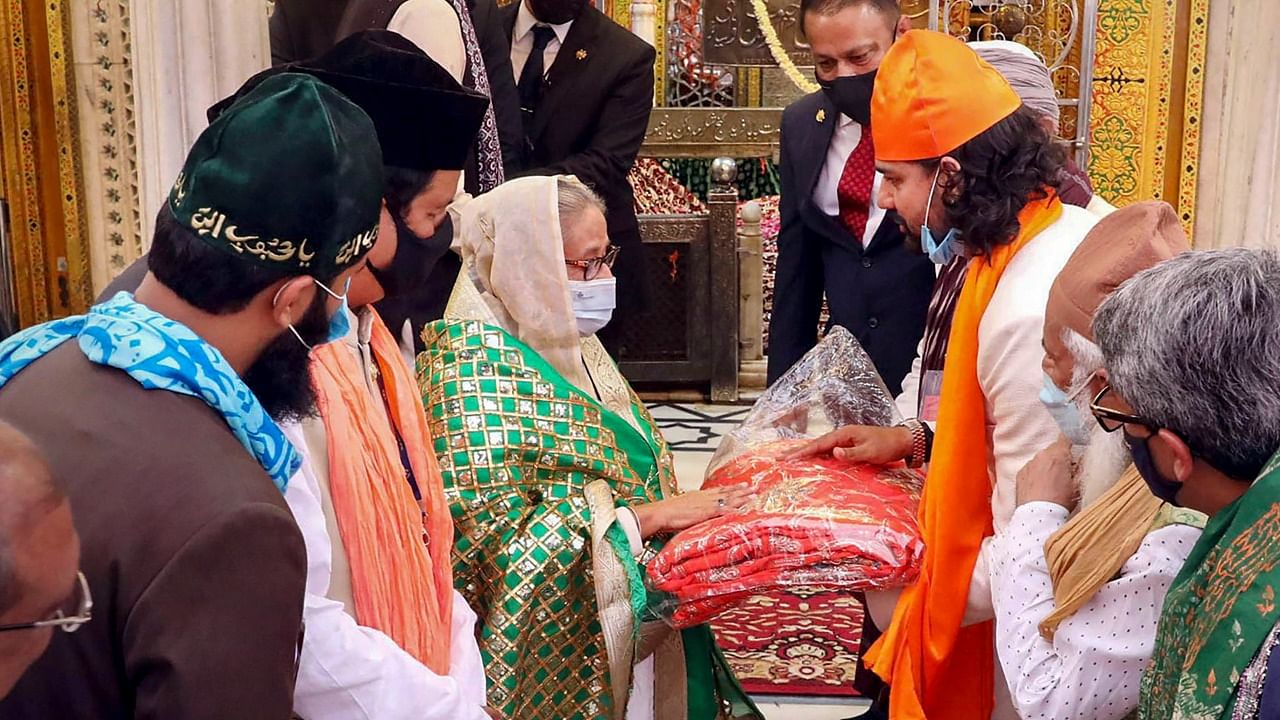
A day before meeting her counterpart Narendra Modi, Bangladesh Prime Minister Sheikh Hasina paid obeisance at Nizamuddin Dargah in Delhi, even as her delegation appeared ready to turn the table on the Government of India in response to any bid by her host to raise the issue of attacks on minorities in her country.
The meeting between Modi and Hasina at Hyderabad House in New Delhi is likely to be followed by the signing of at least seven pacts between India and Bangladesh, including the one on an interim arrangement for sharing of water of the common river Kushiyara.
Hasina’s first official engagement in New Delhi was a meeting with External Affairs Minister S Jaishankar. She also met the Indian Army veterans, who had taken part in the 1971 Liberation War of Bangladesh, at an event held by Dhaka’s diplomatic mission in New Delhi.
Hasina visited the mausoleum of the 13th-14th century Sufi saint Nizamuddin Auliya shortly after arriving in Delhi for a four-day visit to India. Not only her father, Bangabandhu Sheikh Mujibur Rahman, but she herself had also frequented the shrine in the past, particularly when she and her sister had stayed in New Delhi for years after the assassination of her parents and siblings in Dhaka on August 15, 1975.
She is also likely to visit the Ajmer Sharif Dargah, the shrine of another 13th-century Sufi saint Moinuddin Chisti in Ajmer in Rajasthan, during her four-day visit to India.
During his visit to Dhaka in 2015, Modi had visited Dhakeshwari Temple, revered as one of the Shakti Peethas by the minority Hindus of Bangladesh. He had also paid obeisance at other Hindu shrines in Bangladesh, including the Jashoreshwari Kali Temple, during his last visit to the neighbouring country in March 2021.
The Vishwa Hindu Parishad and other Sangh Parivar offshoots had in October-November last year campaigned in India, criticizing the Hasina Government for being “mute spectator” to the vandalism at Durga Puja pandals at Comilla and other places in Bangladesh. The Bharatiya Janata Party’s government, however, had not allowed the campaign to derail the relations between New Delhi and Dhaka and had rather acknowledged the Hasina Government’s initiatives, not only to deny sanctuaries to militants of north-eastern India, but also to rein in the radical Islamists in Bangladesh.
But, ahead of the meeting between the two prime ministers, speculation is rife about Modi utilising the opportunity to subtly convey New Delhi’s concerns over sporadic incidents of attacks on minority Hindus by radical Islamists in Bangladesh.
Hasina may respond by turning the table on the Modi Government, tacitly raising the issue of alleged rise in intolerance against minority Muslims in India.
In an interview to the ANI ahead of her visit to New Delhi, Hasina responded to a question on extremism in Bangladesh by pointing it out that India and several other countries were also afflicted by the menace. She said that all communities had equal rights to celebrate religious festivals in Bangladesh and her government did take actions whenever some attempts were made to disturb communal harmony.
